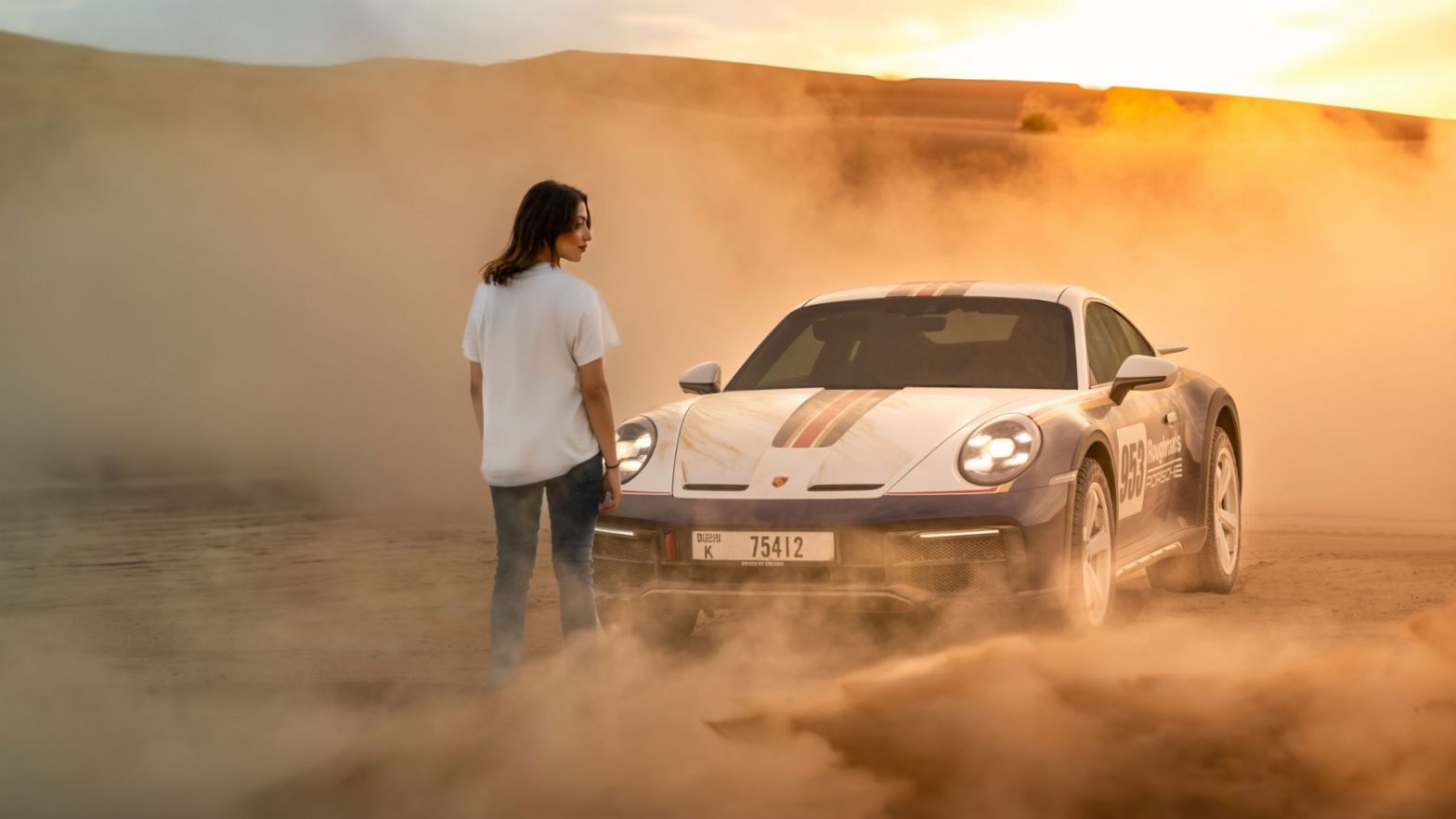Behind the wheel of the 911 Dakar is a face familiar to the UAE’s diverse and fast-growing community of motorsports fans. Amna Al Qubaisi has emerged as a talent to watch in the world of single-seater racing after the young Emirati won two races in the F1 Academy championship last year. As a woman in a male-dominated sport, her rise to sporting prominence could hardly be more impressive or more timely.
Today, however, Al Qubaisi will be far from her natural habitat of the racing circuit. And until recently, the dunes were an unfamiliar place to find a Porsche sports car. But the specially developed lift system of the 911 Dakar offers a remarkable 191 millimetres of ground clearance at speeds of up to 150 km/h. Together with stiffer engine mounts from the GT3, rear-axle steering and PDCC active roll stabilisation, the Dakar promises Al Qubaisi unprecedented athleticism in an environment that was once the preserve of traditional, heavy SUVs.
“It’s reactive, but also has a good balance”
In its Roughroads livery, the 911 Dakar cuts a conspicuous figure through the streets of Abu Dhabi, where Al Qubaisi’s journey begins in the early hours before dawn. Liwa is some 220 kilometres south, via fast paved roads and, later, much less hospitable terrain, all of which the Dakar takes in its stride.
“Driving the 911 Dakar on the road is very smooth, fast, and stable,” says Al Qubaisi. “With the steering, it’s reactive, but also has a good balance. But on the sand dunes, it was so much fun. You can go all out and not worry about losing control. The car is so stable. This was my first drive of the 911 Dakar, and first time driving a Porsche to the Liwa Festival. The experience went way beyond my expectations!”
Inter-generational Porsche connection
Perhaps it’s no surprise that the 23-year-old feels at home behind the wheel of a 911. The Al Qubaisi connection with Porsche is an inter-generational one. The first time she ever watched a motor race was when her father competed in the Porsche Carrera Cup. But these days it is she who is making the headlines, bringing renewed interest in racing to a new generation of young people across the region.
Desert tradition
There is a rich history of desert driving in the Middle East, a vital part of community life as well as, in more recent years, a source of entertainment. At the heart of this tradition is the annual Liwa Tal Moreeb Festival, located in the shadow of the enormous Moreeb Dune in the region’s southerly Empty Quarter desert. All types of high-performance driving are on display at Liwa, a week-long celebration that sees drag races, motor cross, classic car competitions and drifting sharing the same space, supported by the town’s excellent cuisine and local cafés selling gallons of gahwa or Arabic coffee.
En route to Liwa, Al Qubaisi makes a slight detour, driving up to an Emirati home where she is greeted warmly. Such a reception is another acknowledgement of the huge accomplishments that have already made her country proud, turning Al Qubaisi into an inspirational figure for women in motorsport around the world.
When Al Qubaisi finally arrives, parking up beneath the towering Moreeb Dune, the 911 Dakar draws a large crowd of onlookers. And as the sun goes down behind the dunes, silhouetting rows of rugged and highly modified off-road vehicles, in the darkening depths of the desert, neither Al Qubaisi nor the 911 Dakar look remotely out of place. It’s a sign of the times.
911 Dakar (WLTP): Fuel consumption* combined: 11.3 l/100 km; CO₂ emissions* combined: 256 g/km; CO₂ class: G; Status 02/2024
911 GT3 (WLTP): Fuel consumption* combined: 13.0 – 12.9 l/100 km; CO₂ emissions* combined: 294 – 293 g/km; CO₂ class: G; Status 02/2024

